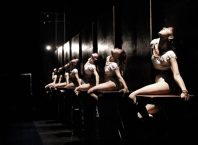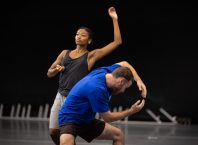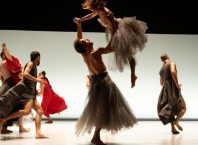The 2011 Gvanim BeMahol (Shades of Dance) Festival came to a close on Saturday, September 10, 2011 after five exhilarating days of dance. The festival reflected the diversity that can be found in the contemporary Israeli dance scene, in the works of 16 new choreographers, each with a distinct presence and approach.
The first festival under the baton of new artistic director Idit Herman was notable for the high quality of the festival overall. This feast of styles and approaches to dance had something for everyone, from aesthetic pieces that relate to what one might call “traditional” contemporary dance, to dance theatre and visual theatre works. Some works were certainly very much “out there,” perhaps even inspiring a moment or two of wondering ‘What the hell is going on here?’ yet each presented a polished, complete piece in which it was clear that all the elements – movement, set, costumes and music – had been carefully considered in their relationship to the work and its themes. The dancers participating in the festival were excellent, bringing an energy and expressive quality to all the works.
Some Midnight East highlights:
Meytal Blanaru’s Aurora is a solo with a distinct form of movement, almost painstakingly slow and angular, with no feeling of flow. While this description may sound unappealing, and is certainly unconventional, Blanaru (who performed her own piece) was mesmerizing, her movements as precise as the pleats in her institution gray dress that softly shimmered into blue. Her eyes looking, searching, her fingers fluttering in articulated movement, at times conveying the sensation of a butterfly pinned to a board.
Lilach Livneh’s Monday, Larissa took on the theme of memory, the desire to remember and to be remembered. The audience was requested to leave the hall before this work, upon entering, each person had their wrist stamped with a quote from Sappho: “Someone, I tell you, in another time will remember us.” The work made use of text, video, blond wigs, gold paint and shawarma in its declared purpose to “make our existence eternal and relive moments that have disappeared.” Repeating movement, moments and images with three dancers (Lilach Livneh, Savion Fishlovich, Moshe Schecter) all in blond wigs, pink sweater and beige trousers, Monday Larissa mixes humor and pathos in a thought-provoking manner.
Sharon Vaisvaser’s 42 Inch was inspired by the book Jonathan Livingston Seagull. 42 inches is the breadth of the gull’s wingspan and this duet performed by Vaisvaser and Oryan Yohanan soars high. One intricate, convoluted shape merges into another, the changing movement reflected in the animated lines moving on the screen behind them,a beautiful, captivating work.
Ido Batash’s Bread and Circuses Blood, on the other hand, is anything but beautiful, yet utterly fascinating in its own perverse way. Avidan Ben Giat undulates, barks, and jerks his body on the stage, flashing a creepy smile or winner pose, constantly shifting between moods and movements. There is a sense of the familiar about the different attitudes he assumes, like watching a newsreel that consolidates a hundred years of history into a few freakishly fast seconds. Wracked with spasms, prone on the floor eyelids fluttering upward as if he is being subjected to repeated electric shocks, prancing or walking on all fours like a gorilla, he gives a brilliant performance, accompanied by a strange metallic creature who croons quite appropriately into a microphone: How does it make you feel?
Lee Meir’s Translation in the Body of the Text delivers as promised, in a work that is brilliantly conceived and executed, precise, poignant and witty. Rarely have I seen text integrated so entirely with the movement, creating the dance together. “Is it working between us?” she asks in the first moments of this piece – Oh, yes! It’s working.
In this year’s choreography competition the judges decided to divide the first prize between two choreographers: Lee Meir for Translation in the Body of the Text, and Yonatan Soutchy for Ben. Judges in this year’s competition were: Rena Shenfeld, Nava Zuckerman, Gadi Dagon, Hadas Maor and Ido Tadmor.





